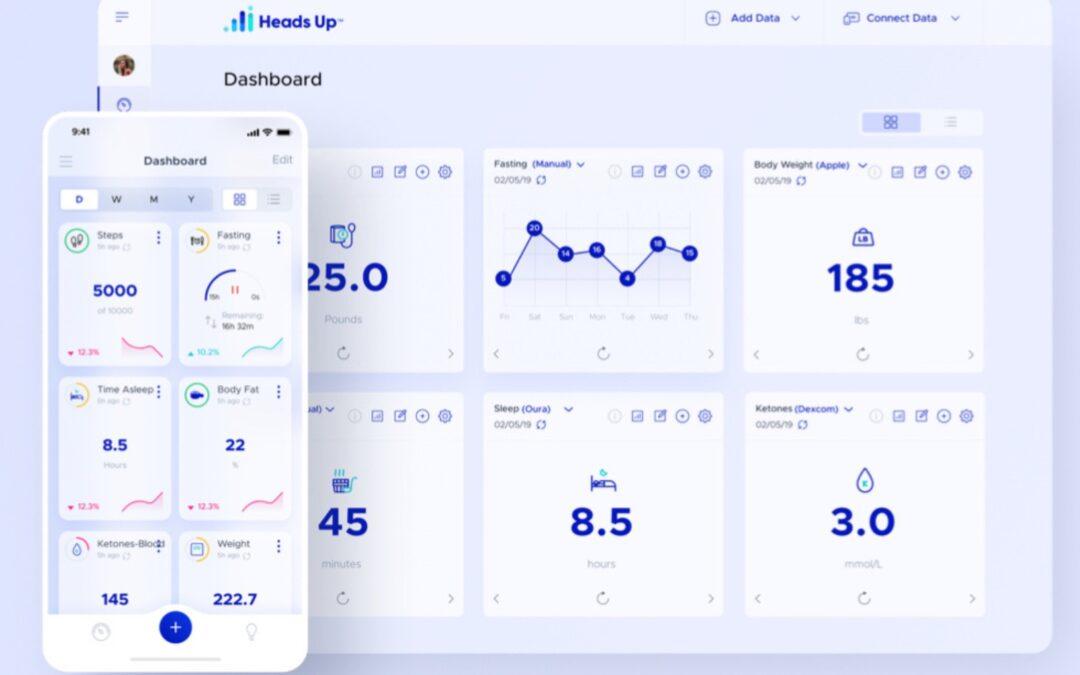Maintaining optimal health is not just about following a realistic and intuitive eating strategy or sticking to a balanced exercise prescription. These are essential, of course, but there’s much more to the story. Optimal health also involves consistently monitoring key health metrics that provide a window into your overall well-being. Understanding and tracking these metrics can help you make more informed decisions about your lifestyle, guiding you toward choices that are more aligned with your current needs and objectives.
We’ve teamed up with Heads Up Health to aggregate your health data and personalize both your training and our recommendations even further. If you’re ready to get started with Heads Up Health, simply speak with your trainer. But until then, let’s dive into the top five health metrics you should monitor—and for a bonus, we’ll reveal a secret sixth metric that’s just as important.
Resting Heart Rate (RHR) and Estimated VO2max
Why It Matters:
Your resting heart rate (RHR) is a vital indicator of cardiovascular fitness. A lower RHR often reflects a more efficient heart and an improved overall fitness level. Meanwhile, VO2max—or maximal oxygen uptake—measures the maximum amount of oxygen your body can use during intense exercise. It’s one of the most accurate indicators of cardiorespiratory endurance, with higher levels indicating better cardiovascular efficiency and endurance.
How to Track:
• Resting Heart Rate: You can easily measure your pulse for 60 seconds each morning before getting out of bed. For a more convenient option, use a fitness tracker or smartwatch that continuously monitors your RHR.
• Estimated VO2max: Many modern wearables, including fitness trackers and smartwatches, estimate VO2max based on your heart rate data and exercise intensity. Keeping an eye on this metric allows you to monitor improvements in your cardiovascular fitness over time.
Blood Glucose Levels
Why It Matters:
Monitoring blood glucose levels isn’t just for people with diabetes. It’s a proactive way for anyone to gain control over their health. By understanding your blood sugar patterns, you can make more informed decisions about your eating strategy, exercise prescription, and overall lifestyle. This, in turn, helps you improve your metabolic health, energy levels, and long-term well-being.
How to Track Health Metric:
To track your blood glucose levels, you can use a glucometer or a continuous glucose monitor (CGM) from companies like Levels Health. Regularly checking your blood sugar trends over time can be crucial for effectively managing your metabolic health.
Advanced Lipid Markers
Why It Matters:
Cholesterol plays a key role in building healthy cells, but imbalances in your cholesterol levels can heighten your risk of cardiovascular diseases. To truly understand your cardiovascular risk, you’ll want to look beyond the standard cholesterol measures and dive into advanced lipid markers.
Apolipoprotein B (ApoB)
Why It Matters:
ApoB is a protein found in LDL and other particles that contribute to artery plaque. It’s considered a more accurate marker of cardiovascular risk than LDL alone because it reflects the number of harmful particles that can clog your arteries.
Optimal Levels:
ApoB levels should be below 90 mg/dL for most people, though for those at high risk of heart disease, levels below 80 mg/dL are often recommended.
Lipoprotein(a) [Lp(a)]
Why It Matters:
High levels of Lp(a), a genetic variation of LDL cholesterol, are strongly linked to an increased risk of heart disease and stroke. It’s an independent risk factor, meaning it can raise your cardiovascular risk even if your other cholesterol levels are normal.
Optimal Levels:
Ideally, Lp(a) should be under 30 mg/dL, but because this marker is genetically influenced, your doctor may recommend specific treatments or lifestyle changes based on your levels.
Small Dense LDL Particles
Why It Matters:
Small dense LDL particles are more likely to penetrate arterial walls and contribute to plaque buildup, making them more dangerous than larger, less dense LDL particles.
Optimal Levels:
Fewer small dense LDL particles are better. Your healthcare provider can help you assess this marker through advanced lipid testing.
Non-HDL Cholesterol
Why It Matters:
Non-HDL cholesterol encompasses all the cholesterol in your blood that can cause plaque formation, including LDL and VLDL. It’s a more comprehensive measure of your cardiovascular risk than just LDL.
Optimal Levels:
For most people, non-HDL cholesterol should be under 130 mg/dL, with lower levels recommended for those at higher cardiovascular risk.
Body Fat Percentage
Why It Matters:
Unlike total body weight, which doesn’t account for fat distribution or muscle mass, body fat percentage offers a more accurate picture of your fitness level. Tracking this metric can give you deeper insights into your overall health and help you better assess changes in body composition.
How to Track Health Metric:
You can use a four-compartment BIA smart scale like the ones from In-Body, or consider methods like a SECA scan, DEXA scan, or hydrostatic weighing for more accurate results. Regular tracking helps you monitor body composition changes in real-time and adjust your fitness plan accordingly.
Sleep Quality
Why It Matters:
Quality sleep is essential for both your physical and mental health. Poor sleep has been linked to obesity, cardiovascular disease, and cognitive decline. Therefore, improving your sleep quality can significantly impact your overall well-being.
How to Track Health Metric:
To monitor your sleep, use a high-quality sleep tracker such as an Oura ring. These devices help you track your sleep stages, duration, and overall quality, allowing you to identify patterns over time. By doing so, you can see how factors like eating habits, stress, and exercise impact your sleep.
Mental Health (Secret 6th Metric)
Why It Matters:
Often overlooked, mental health is just as important as physical health. It influences how you handle stress, relate to others, and make decisions. Neglecting mental health can lead to or exacerbate physical health issues, such as heart disease and chronic pain.
How to Track Health Metric:
There are many ways to keep tabs on your mental health, from mood tracking apps to stress monitors. Here are a few options:
• Mood Tracking: Use a mental health app or a journal to log your daily moods and any patterns or triggers that arise.
• Stress Levels: Many wearables can track your heart rate variability (HRV), an indicator of stress. These insights can help you manage stress more effectively.
• Mindfulness Practices: Incorporate mindfulness or meditation into your routine and track your consistency with apps like Headspace or Calm. These practices can improve emotional regulation and reduce stress.
Conclusion
By consistently tracking these six key health metrics, you can gain a comprehensive understanding of your overall well-being. With the help of technology such as smartwatches, health apps, and advanced blood tests, it’s never been easier to monitor your health in real-time. Remember to consult with your healthcare provider for personalized advice and to interpret your metrics in the context of your overall health. Prioritizing both your physical and mental health will lead you toward a balanced, healthier life.
FAQs regarding Health Metrics and Tracking:
How can tracking my resting heart rate improve my health?
• Tracking your resting heart rate helps you monitor cardiovascular fitness. A lower RHR generally indicates a healthier heart.
Why should I monitor blood glucose levels if I’m not diabetic?
• Monitoring blood glucose levels can help prevent metabolic issues, boost energy, and improve long-term well-being.
What is the significance of advanced lipid markers in cholesterol tests?
• Advanced lipid markers offer deeper insights into cardiovascular risk, going beyond standard cholesterol tests to help prevent heart disease.
How does body fat percentage provide a better health assessment than body weight?
• Body fat percentage distinguishes between fat and muscle mass, offering a clearer picture of your overall fitness and health progress.
How can sleep tracking improve my health?
• Tracking your sleep quality helps you understand how lifestyle factors affect your sleep, which is essential for mental and physical recovery.
Why is mental health included as a key health metric?
• Mental health directly impacts physical well-being and overall quality of life, influencing how you cope with stress and make daily decisions.



















